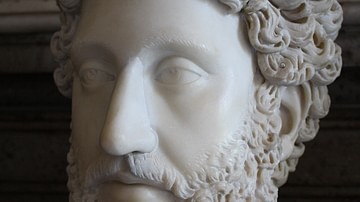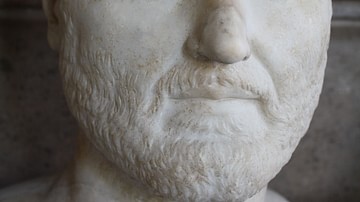
Vespasian was Roman emperor from 69 to 79 CE. Vespasian was the last of the four emperors who governed the Roman Empire in the year 69 CE. The previous three had died either by murder or suicide. Unlike Galba, Otho and Vitellius, Vespasian would die of natural causes in 79 CE. He and his sons, Titus and Domitian, formed what would become known as the Flavian Dynasty.
Titus Flavius Vespasianus was born into “a family of little distinction” in the small town of Falacrina just north of Rome on November 17, 9 CE. The historian Suetonius in his The Twelve Caesars would later describe him as “square-shouldered, with strong, well-formed limbs, but always wore a strained expression on his face…. (He) enjoyed perfect health and took no medical precautions for preserving it.” Although he was raised by his paternal grandmother, Tertulla, he was actually the son of Sabinus, a customs supervisor in Asia (who later died while a banker in Switzerland) and Vespasia Polla. He had an older brother, also named Sabinus, who became a consul and governor. The future emperor married Flavia Domitilla who bore him three children: Titus, Domitian, and Domitilla (she died in infancy). After his wife's death, he “married” his ex-mistress Caenis. The wedding was never official because of her social standing as a slave.
Despite not coming from a noble family, Vespasian served as a colonel in Thrace (north of Greece) and a quaestor (financial official) on the island of Crete and in Cyrenaica (eastern Libya). Before incurring the wrath of Emperor Claudius's wife Agrippina (as many did), he was the commander of a legion in Germany and Britain. He fought in over thirty battles and captured at least twenty cities. Later, he served in Africa in the early 60's CE where he suffered the disdain of the local population, often being pelted with turnips. Throughout his time away from Rome during the reigns of Caligula and Claudius, Vespasian found political success but never financial success; he was always in need of money. Although part of Emperor Nero's “inner circle,” he disappeared temporarily from public service after he supposedly fell asleep during one of Nero's long and boring concerts. However, when rebellions broke out in Judea in 66 CE, Vespasian, because of his ability to command, was sent with his son Titus to disperse the rioters. In his War of the Jews, Flavius Josephus claimed that Nero could find no one “equal to the task” to “make war with the Jews.” He added, “So Nero esteemed these circumstances as favourable omens, and saw that Vespasian's age gave him sure experience, and great skill, and that he has his sons as hostages for his fidelity to himself, and that the flourishing age they were in would make them fit instruments under their father's prudence.”

When Nero died and Galba took the throne, Vespasian and Titus waited in Judea for orders (Domitian was already in Rome). Since he had been somewhat loyal to Nero, Vespasian feared the future; however, Emperor Galba figured him of little consequence and ignored him. To demonstrate his lack of hostility to Galba, Vespasian sent Titus to Rome in late 68 CE; however, when Galba was murdered and the throne was up for grabs between Otho (governor of Lusitania) and Vitellius (governor of Lower Germany), Titus returned to Judea. Before he did anything he would regret, Vespasian decided to wait until a winner was declared. Cassius Dio wrote in his Roman History that “Vespasian was never inclined to be rash, and he hesitated very much about involving himself in such troublesome affairs.”
When Otho committed suicide in order to prevent future loss of life at the First Battle of Bedriacum, Vitellius was named the new emperor. It wasn't long, however, before rumblings against Vitellius began to appear in the West. Vespasian was the preferred choice among many in the army. With this growing animosity for Vitellius spreading to Rome, Vespasian acted quickly and sent troops to Italy to engage the new emperor, while he crossed Egypt and captured Alexandria, cutting off the grain supply to Rome. After Vitellius's loss to the army of the West at the Second Battle of Bedriacum, the soon-to-be-deposed emperor fled back to Rome planning to escape certain death; compromise and peace were out of the question. He now feared for his wife and children. Cassius Dio wrote, “One moment he was inclined to cling to the sovereignty and was making every preparation for war; the next moment he was ready to abdicate voluntarily and was making every preparation for returning to private life.” Vespasian's army dragged Vitellius from his hiding place, tortured and killed him, and threw his body in the Tiber. Much of the city, however, had already been pillaged and fires set throughout. Traveling to Rome, Vespasian was finally enthroned December 26, 69 CE.

Although some felt him to be “crafty,” Vespasian proved to be an effective emperor. He was well liked (even demonstrating a sense of humour), and his reign was considered a time of peace and calm. One of his first acts was to restore the morale of the army, discharging some and punishing others for what was termed ”indulging in excesses.” Next, he rebuilt many of the homes and buildings burned during the final days of Vitellius's reign. He built new temples and the massive Coliseum (Colosseum) - also called “the Flavian Amphitheatre.” Unlike many of those who ruled before him, he held no grudges towards those who had opposed him and executed none of his enemies. Suetonius and Tacitus both commented on his one failing – avarice. Tacitus wrote, “Vespasian showed himself master of the situation. He restored Roman prestige and recovered her shattered finances. It was hard that he should be called 'miser' for his pains.” To bring more money into the troubled Roman treasury, he doubled tributes from the provinces, charged fees from candidates for public offices, and sold pardons. However, he wasn't completely greedy; he paid salaries to those who taught Latin and Greek and awarded prizes to poets and artists.
While visiting outside Rome, he contracted “undulant fever.” Upon returning home, he avoided proper care and travelled to his summer home in Rieti. One night, after a short swim, he caught a chill and died on June 23, 79 CE; he was 69 years old. His son Titus was named his successor but he would only serve two years and be followed by the ill-prepared Domitian.







